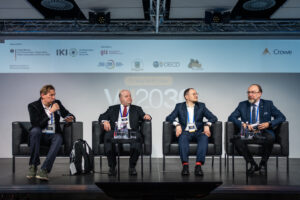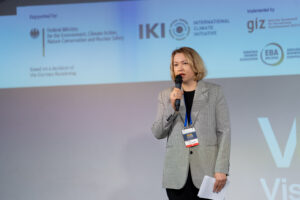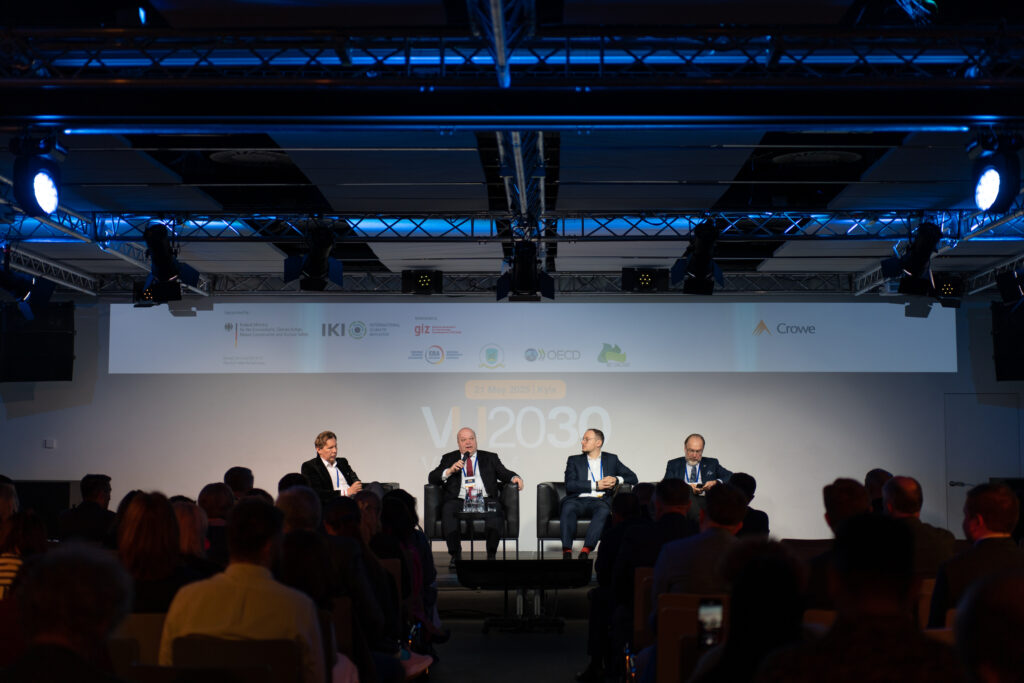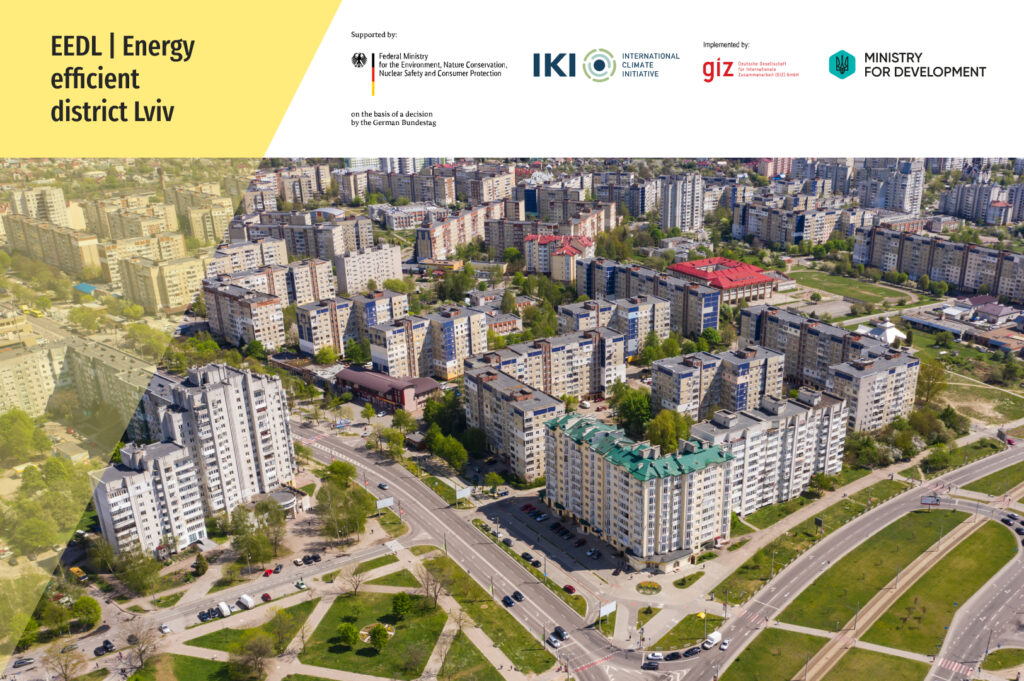The international business forum “Vision of Ukraine 2030”, held in Kyiv on May 21, brought together experts, representatives of the government, business, and international organizations to discuss long-term development scenarios for Ukraine amid full-scale war, climate change, and global economic challenges.
The forum was co-organized by Crowe Mikhailenko and the regional project “Promoting Green Deal Readiness in the Eastern Partnership Countries” (PROGRESS), which is funded by the Federal Ministry for the Environment, Climate Action, Nature Conservation and Nuclear Safety of Germany (BMUKN) and implemented in Ukraine by a consortium of organizations, including the Deutsche Gesellschaft für Internationale Zusammenarbeit (GIZ), the Organisation for Economic Co-operation and Development (OECD), and the Institute for Economics and Forecasting of the National Academy of Sciences of Ukraine.

Participants discussed key areas of Ukraine’s post-war recovery — especially green transformation, adaptation to climate change, and integration into the EU market. In this context, one of the key points was the renewal of the political structure in Germany, especially the expanded mandate of the ministry responsible for environmental policy. This was mentioned in the speech by Eva Kracht, Director General for International and European Policy of the Federal Ministry for the Environment of Germany:
“After the new government was formed, we brought climate policy back under the mandate of our ministry — it is now the Ministry for the Environment, Climate Action, Nature Conservation and Nuclear Safety. And we will again work with you on climate issues as the Ministry for the Environment. We have a new minister — his name is Carsten Schneider. He comes from eastern Germany and has a strong interest in our eastern neighbours. We believe that including climate action and environmental protection in the recovery process from the very beginning is extremely important.”

Yvonne Lindenlaub, Head of the Division for Eastern Europe, Central Asia, Africa and the Middle East at the same ministry, also spoke at the forum. She talked about the continued development of the “Green Recovery Platform” — an initiative launched in 2024 in Berlin during the Ukraine Recovery Conference, in cooperation with the Ministry of Environmental Protection and Natural Resources of Ukraine.
“This is not about rebuilding things the old way. It’s about modern and sustainable development, focused on the EU market and Ukraine’s future membership,” said Lindenlaub.
These remarks highlight the importance of integrating environmental aspects into Ukraine’s recovery and development process, as well as the need for international cooperation to ensure a sustainable future.
Particular attention at the forum was given to adapting agriculture to climate change. According to Martina Kolb, Director of the PROGRESS programme, Ukraine is a critically important agricultural exporter on the global market, which makes the modernization of its agricultural sector an essential part of sustainable development.
“The future of Ukraine’s children truly depends on climate-resilient agriculture. Climate change is already happening — it’s not a future issue, but a current challenge,” she said.
According to her, the PROGRESS project is working together with Ukrainian ministries to analyse climate risks in agriculture , and to explore opportunities for implementing innovative solutions — such as smart irrigation, water resource management, crop adaptation, and the use of artificial intelligence.
“We support the analysis of climate risks in agricultural crop production and livestock farming, and we are looking into innovative solutions, including smart irrigation systems, water management, crop adaptation, and artificial intelligence,” she added.
During the sessions, participants discussed not only the challenges, but also practical opportunities for shifting to a new growth model. As Krzysztof Michalak, Senior Programme Manager at the OECD, emphasized:
“Ukraine’s post-war recovery is a chance not just to rebuild, but to transform the country into a modern, sustainable, and green economy. It’s a window of opportunity, similar to what Central European countries experienced after the fall of the Berlin Wall.”
The need to combine economic efficiency with environmental responsibility was also addressed by Oksana Osmachko, Deputy Minister of Agrarian Policy and Food of Ukraine.

Responding to a common concern among businesses about the value of investing in green technologies, she noted:
“It’s a difficult question: is it worth investing in green technologies and developing the green direction in agriculture? It’s about finding a balance between developing the agricultural sector and following the Green Deal — and that’s a challenge not only for our country. Today, many businesspeople ask: why choose green recovery? After all, there are investments with higher returns. Our task is to explain why investing in climate adaptation and environmental protection is worthwhile.”
A separate discussion was devoted to the role of green energy in Ukraine’s recovery. As Élise Vigier, Deputy Director of the GIZ programme “Green Recovery of Ukraine’s Energy Sector”, underlined, the full-scale war and climate change are not two separate issues, but a common challenge that requires an integrated response.
“Russia is threat number one to Ukraine and its people. But there’s also a second battle — the one against climate change. These two threats make the green transformation extremely important for Ukraine,” she said.
“These are not two separate goals — they are one: green reconstruction and energy transition, which also support Ukraine’s path toward EU membership,” Élise Vigier stressed.

Most forum participants agreed on one key point: integrating climate solutions into the recovery process is a vital part of Ukraine’s economic and energy strategy. And now is the time to turn these approaches into practical action.
The regional project “Promoting Green Deal Readiness in the Eastern Partnership Countries” (PROGRESS), which is funded by the Federal Ministry for the Environment, Climate Action, Nature Conservation and Nuclear Safety of Germany (BMUKN) and implemented in Ukraine by a consortium of organizations, including the Deutsche Gesellschaft für Internationale Zusammenarbeit (GIZ), the Organisation for Economic Co-operation and Development (OECD), and the Institute for Economics and Forecasting of the National Academy of Sciences of Ukraine.
You are currently viewing a placeholder content from YouTube. To access the actual content, click the button below. Please note that doing so will share data with third-party providers.










